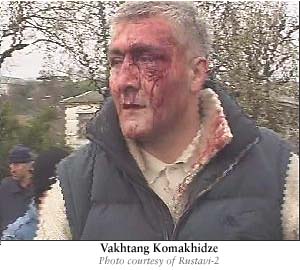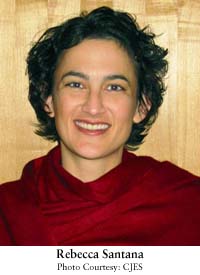Europe & Central Asia
2004
Attacks on the Press 2003: Turkmenistan
In 2003, Turkmenistan’s megalomaniacal dictator, President-for-life Saparmurat Niyazov, continued to tighten his grip on the country’s politics, natural resources, and the press. A wave of political repression against Niyazov’s real and imagined opponents followed an alleged assassination attempt against the president on November 25, 2002. The president escaped unharmed, and some Turkmen journalists and opposition…
Attacks on the Press 2003: Ukraine
The 2000 murder of internet journalist Georgy Gongadze continued to dog Ukrainian President Leonid Kuchma, who was fighting for political survival in 2003. Gongadze, editor of Ukrainska Pravda, an online publication that often reports on government corruption, disappeared on September 16, 2000. A headless corpse believed to be Gongadze’s was found shortly after his disappearance,…
Attacks on the Press 2003: Uzbekistan
Increased international aid and the presence of U.S. troops using Uzbekistan as a base for the “war on terror” have focused new international attention on the country, forcing President Islam Karimov to pay lip service to press freedom. “Today, there are no boundaries to the flow of information, and any attempts to restrict freedom of…
Attacks on the Press in 2003: Journalists in Prison
There were 138 journalists in prison around the world at the end of 2003 who were jailed for practicing their profession. The number is the same as last year. An analysis of the reasons behind this is contained in the introduction on page 10. At the beginning of 2004, CPJ sent letters of inquiry to…
CPJ concerned about recent closures of independent media outlets
Your Excellency: The Committee to Protect Journalists (CPJ) is deeply concerned about recent closures of independent media outlets in Ukraine. We believe that these closures are part of a sweeping campaign to eliminate voices that are critical of the government and to block public access to independent sources of information in the run-up to presidential elections scheduled for October.

Journalist attacked
New York, March 5, 2004—Vakhtang Komakhidze, a reporter for the well-respected “60 Minutes” investigative journalism program on independent television station Rustavi-2 was brutally attacked today in the autonomous republic of Ajaria in southern Georgia. According to Akaki Gogichaishvili, the host of “60 Minutes,” Komakhidze had spent the last two weeks reporting in Ajaria and was…
CPJ concerned about RFE/RL journalists
Your Excellency: The Committee to Protect Journalists (CPJ), an independent, nonprofit organization committed to defending press freedom worldwide, is extremely concerned about escalating government persecution of Turkmen journalists working for the U.S. government-funded Radio Free Europe/Radio Liberty (RFE/RL).

JOURNALIST HARASSED AND FIXER ABDUCTED
New York, March 2, 2004—The Committee to Protect Journalists (CPJ) strongly condemns the harassment of Cox Newspapers Moscow correspondent Rebecca Santana and the abduction of her fixer and driver, Ruslan Soltakhanov, following a recent reporting trip to Chechnya. Santana and Soltakhanov—who has been a fixer and driver for other Western journalists working in Chechnya—traveled in…
CPJ RECEIVES OSCE PRIZE FOR JOURNALISM AND DEMOCRACY
Acceptance Speech by Ann Cooper ON BEHALF OF THE AMERICAN JOURNALISTS WHO FOUNDED THE COMMITTEE TO PROTECT JOURNALISTS NEARLY A QUARTER OF A CENTURY AGO, I THANK YOU FOR THIS GREAT HONOR. THIS PRIZE COMES AT A CRUCIAL MOMENT FOR GLOBAL PRESS FREEDOM–A TIME WHEN MANY GOVERNMENTS, INCLUDING THE UNITED STATES, INCREASINGLY CITE THE WAR…
Journalist sentenced to three months in prison
New York, February 12, 2004—The Committee to Protect Journalists (CPJ) is deeply concerned about Andrzej Marek, editor-in-chief of the weekly Wiesci Polickie (Police News) in the western Polish town of Police, who may be sent to jail for three months for refusing to apologize to a local official who has accused the journalist of defamation.…